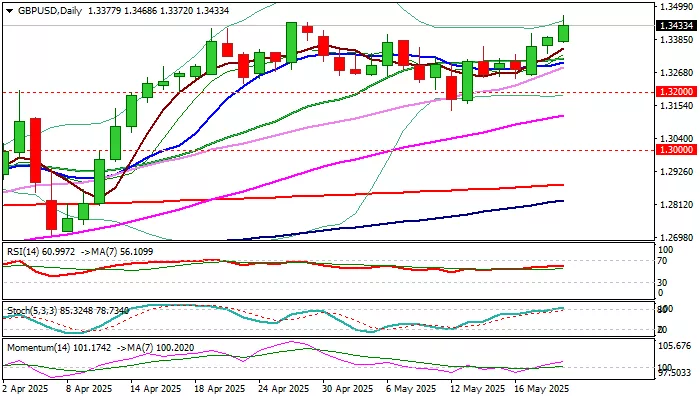The GBP/USD currency pair climbed to a multi-year high, reaching 1.3465 after the release of UK inflation data. This marks an increase of over 11.3% from its lowest level earlier this year.
The surge followed a report from the UK’s Office of National Statistics showing a sharp rise in consumer inflation. The headline Consumer Price Index (CPI) jumped from 0.3% in March to 1.2% in April, exceeding expectations of 1.1%. On an annual basis, inflation rose to 3.5%, up from 2.6% previously.
Core inflation, which excludes food and energy prices, also rose significantly. It increased from 0.5% to 1.4% monthly and from 3.4% to 3.8% yearly, surpassing forecasts.
These figures highlight the UK’s current economic challenge: stagflation. This means the country faces both high inflation and slow economic growth. Managing this is difficult because lowering interest rates could worsen inflation, while raising rates might slow growth further.
Looking ahead, traders will watch upcoming UK manufacturing and services PMI data. Economists predict the manufacturing PMI will stay below 50, indicating contraction, while the services PMI is expected to rise to 50, signaling stability.
In the US, flash PMI data is also due. The manufacturing PMI is forecasted at 49.9, just below the growth threshold, and the services PMI at 51, indicating expansion. Additionally, US jobless claims data will be important to monitor.
Technically, the GBP/USD pair broke above the upper boundary of a bullish flag pattern, part of a larger cup and handle formation. This chart pattern suggests further upside potential. The cup has a depth of about 9.5%, implying a long-term target near 1.4720 if the pattern completes.
For traders, the recommendation is to buy GBP/USD with a take-profit target at 1.3600 and a stop-loss at 1.3350, aiming for gains over the next one to two days. Conversely, a bearish position would target 1.3350 with a stop-loss at 1.3600.
The recent inflation data and technical signals together point to continued strength in the GBP/USD pair in the near term.
Related topics:


